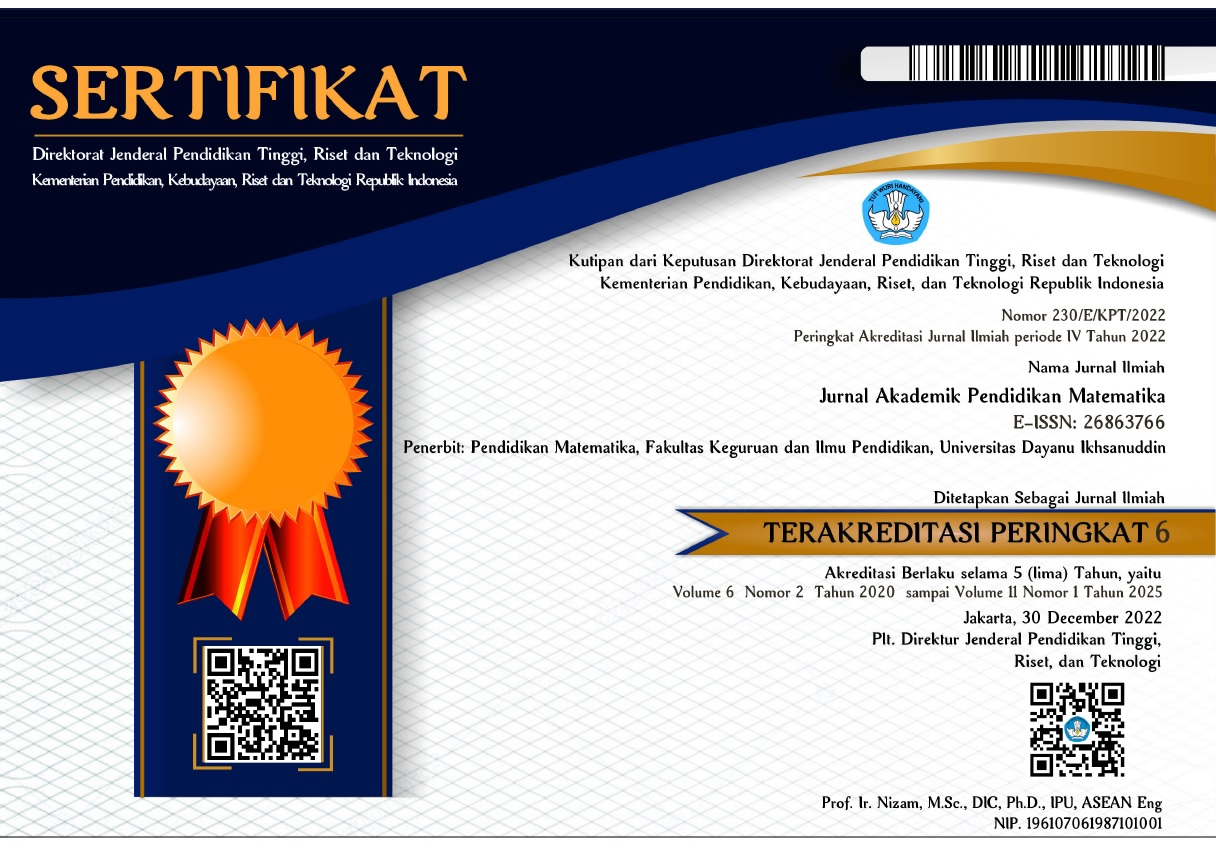The Effect Of Confidence And Emotional Intelligence On Mathematics Story Complexing Ability Of Students Of Class VIII SMP Negeri 4 Baubau
DOI:
https://doi.org/10.55340/japm.v7i2.439Keywords:
self-confidence, emotional intelligence , math story questionsAbstract
Problem statement of this research was Whether there was: 1) simultaneous influence between self-confidence and emotional intelligence on ability to solve Mathematics word problem; 2) a positive and significant influence of self-confidence on ability to solve Mathematics word problem; and 3) a positive and significant influence of emotional intelligence on ability to solve Mathematics word problem of the student at VIII grade of SMP Negeri 4 Baubau. This research was quantitative research with the type of Expost Facto. Population of this research was all students at VIII grade of SMP Negeri 4 Baubau with the total number was 352 students and spread over 11 parallel classes, with the sampling in this research of 25% of the total population or as many as 88 students. Data collection technique in this research conducted by using research instrument which was questionnaire of self-confidence and emotional intelligence as well as mathematical ability tests, to measure students’ mastery of mathematical statistics material in this case the word problem in the form of probability. The data obtained were analyzed using descriptive analysis and inferential analysis, in the form of multiple linear regression analysis.Based on the results of the research, it was concluded: 1) there was a simultaneous influence of self-confidence and emotional intelligence on the ability to solve mathematics word problems of student at VIII grade of SMP Negeri 4 Baubau, this could be seen from the value of Sig. < alpha, (0.013 < 0.050); 2) partially, there was a negative effect of self-confidence on the ability to solve mathematics word problems of student at VIII grade of SMP Negeri 4 Baubau, this could be seen from the value of Sig. < alpha, (0.049 < 0.050). 3) As for testing the third hypothesis, there was a positive influence of emotional intelligence on the ability to solve mathematics word problems of student at VIII grade of SMP Negeri 4 Baubau, this could be seen from the value of Sig. < alpha, (0.017 < 0.050).
Downloads
References
Anzar, W. O. S. A. P., & Lestari, D. (2020). Pengaruh Penerapan Model Pembelajaran Discovery Learning Terhadap Kepercayaan Diri Siswa Kelas VII SMP Negeri 22 Buton. Jurnal Akademik Pendidikan Matematika, 6(2), 91–95. https://www.ejournal.lppmunidayan.ac.id/index.php/matematika
Apriyana, N., & Rahmawati, D. (2017). Pengaruh Profitabilitas, Solvabilitas, Ukuran Perusahaan dan Ukuran Kap Terhadap Audit Delay Pada Perusahaan Properti dan Real Estate yang Terdaftar di Bursa Efek Indonesia Periode 2013-2015. Jurnal Nominal: Barometer Riset Akuntansi Dan Manajemen, VI(2), 108–124.
Budiyono. (2008). Kesalahan Mengerjakan Soal Cerita Dalam Pembelajaran Matematika. Jurnal Paedagogia, 11(1), 1–8.
Fakhiroh, A., & Hidayatullah, S. (2018). Pengaruh Percaya Diri Terhadap Keterampilan Berbicara. EL-IBTIKAR: Jurnal Pendidikan Bahasa Arab, 7(1), 34–46.
Fitria, W. A., & Nurlita, M. (2020). Pengaruh Kepercayaan Diri dan Kecerdasan Emosional Terhadap Hasil Belajar Siswa Melalui Daring SMP Negeri 18 Baubau. Jurnal Akademik Pendidikan Matematika, 6(2), 152–162. https://www.ejournal.lppmunidayan.ac.id/index.php/matematika
Fitriyani, L. (2015). Peran pola asuh orang tua dalam mengembangkan kecerdasan emosi anak. Lentera, 17(1), 93–110. http://staff.uny.ac.id/sites/default/files/artikel EQ.pdf.
Hamdi, S., & Abadi, A. M. (2014). Pengaruh Motivasi, Self-Efficacy dan Latar Belakang Pendidikan Terhadap Prestasi Matematika Mahasiswa PGSD STKIP-H dan PGMI IAIH. Jurnal Riset Pendidikan Matematika, 1(1), 77–87.
Khamid, A. (2016). Peningkatan Hasil Belajar Peserta Didik Dengan Model Pembelajaran Think Pair Share Materi Operasi Hitung Bilangan Bulat Kelas V Semester I MI Islamiyah Candi Tahun Pelajaran 2015/2016 [Universitas Islam Negeri Walisongo Semarang]. http://eprints.walisongo.ac.id/id/eprint/6219
Kriesniati, P., Yuniarti, D., & Nohe, D. A. (2013). Analisis Korelasi Somers’d Pada Data Tingkat Kenyamanan Siswa-Siswi SMP Plus Melati Samarinda. Jurnal Barekeng (Jurnal Ilmu Matematika Dan Terapan), 7(2), 31–40.
Kurnia, R. P. (2015). Penggunaan Model Project Based Learning Untuk Meningkatkan Percaya Diri dan Hasil Belajar Siswa Pada Pembelajaran IPS Materi Kenampakan Alam Wilayah Indonesia (Penelitian Tindakan Kelas Terhadap Siswa Kelas V SD Muararajeun 1 Kota Bandung Tahun Ajaran 201 [Universitas Pasundan Bandung]. http://repository.unpas.ac.id/id/eprint/8838
Lestari, D., & Febriani, Y. (2019). Efektivitas Model Pembelajaran Interaktif Setting Kooperatif (ISK) Ditinjau dari Kemampuan Komunikasi Matematis Siswa SMP Negeri 2 Baubau. Jurnal Akademik Pendidikan Matematika, 5(2), 131–135.
Mardiyani, F. (2020). Hubungan Antara Kepercayaan Diri Dengan Kecemasan Menghadapi Dunia Kerja Pada Mahasiswa Fakultas Ushuluddin dan Dakwah Jurusan Bimbingan Konseling Islam di IAIN Surakarta. Institut Agama Islam Negeri Surakarta.
Marzuqi, L. (2014). Pengaruh Tingkat Kecerdasan Emosional dan Motivasi Terhadap Hasil Belajar Matematika Siswa Kelas VII Materi Keliling dan Luas Bangun Segi Empat di MTs Negeri Tunggangri Tahun Ajaran 2013/2014 [Institut Agama Islam Negeri Tulungagung]. http://repo.iain-tulungagung.ac.id/id/eprint/126
Maulyda, M. A. (2020). Paradigma Pembelajaran Matematika Berbasis NCTM (C. I. Gunawan, K. Ni’mah, & V. R. Hidayati (eds.); 1st ed., Issue 16 Januari 2020). CV. IRDH Malang.
Ningsih, W. F., & Hayati, I. R. (2020). Dampak Efikasi Diri Terhadap Proses & Hasil Belajar Matematika. Journal On Teacher Education (JOTE), 1(2), 26–32.
Norianggono, Y. C. P., Hamid, D., & Ruhana, I. (2014). Pengaruh Lingkungan Kerja Fisik dan Non Fisik Terhadap Kinerja Karyawan (Studi Pada Karyawan PT. Telkomsel Area III Jawa-Bali Nusra di Surabaya). Jurnal Administrasi Bisnis (JAB), 8(2), 1–10. administrasibisnis.studentjournal.ub.ac.id
Novferma, N. (2016). Analisis Kesulitan dan Self-Efficacy Siswa SMP Dalam Pemecahan Masalah Matematika Berbentuk Soal Cerita. Jurnal Riset Pendidikan Matematika, 3(1), 76–87. https://doi.org/http://dx.doi.org/10.21831/jrpm.v3i1.10403
Pasek, N. S. (2016). KPengaruh Kecerdasan Intelektual Pada Pemahaman Akuntansi Dengan Kecerdasan Emosi dan Kecerdasan Spiritual Sebagai Variabel Pemoderasi. Jurnal Ilmiah Akuntansi, 1(1), 62–76.
Permatasari, S. W. E., & Muslim, S. (2014). Implementasi Model Pembelajaran Contextual Teaching and Learning (CTL) Pada Standar Kompetensi Dasar Memasang Instalasi Penerangan Listrik di SMKN 7 Surabaya. Jurnal Pendidikan Teknik Elektro, 3(2), 47–53.
Pratiwi, I. D., & Laksmiwati, H. (2016). Kepercayaan Diri dan Kemandirian Belajar Pada Siswa SMA Negeri “X.” Jurnal Psikologi Teori Dan Terapan, 7(1), 43–49.
Rakhmania, A. (2018). Pengaruh Kemampuan Pemecahan Masalah Terhadap Hasil Belajar Matematika (Penelitian Kuantitatif Deskriptif Kelas V Sekolah Dasar Di Kecamatan Sindangkerta Kabupaten Bandung Barat) [Universitas Pasundan Bandung]. http://repository.unpas.ac.id/id/eprint/39169
Rapareni, Y. (2013). Analisis Pengaruh Kompetensi Komunikasi, Kecerdasan Emosional, Dan Budaya Organisasi Terhadap Kinerja Karyawan Radio Republik Indonesia Palembang. Universitas Diponegoro Semarang, 3(1), 35–59. http://news.palcomtech.com/wp-content/uploads/YUSSI_JE030120135.pdf.
Schunk, D. H. (2012). Learning Theories An Educational Perspective. In P. Smith (Ed.), Pearson Education (6th ed., Vol. 6). Pearson Education.
Septifany, A. T., Hidayat, R. R., & Sulasmiyati, S. (2015). Analisis Pengaruh Inflasi, Tingkat Suku Bunga, Nilai Tukar Rupiah dan Cadangan Devisa Terhadap Penanaman Modal Asing di Indonesia (Studi Pada Bank Indonesia Periode Tahun 2006-2014). Jurnal Administrasi Bisnis (JAB), 25(2), 1–7. administrasibisnis.studentjournal.ub.ac.id
Suaibah, S. (2010). Kemampuan Siswa SMP Kelas VIII di Kota Malang Dalam Menyelesaikan Soal Cerita Matematika Ditinjau Dari Tahapan Analisis Kesalahan Newman [Universitas Negeri Malang]. http://repository.um.ac.id/id/eprint/15260
Sutisna. (2010). Analisis Kesulitan Menyelesaikan Soal Cerita Matematika Pada Siswa Kelas IV MI YAPIA Parung-Bogor. Universitas Islam Negeri Syarif Hidayatullah Jakarta.
Wahyuddin. (2016). Analisis Kemampuan Menyelesaikan Soal Cerita Matematika Ditinjau dari Kemampuan Verbal. Beta Jurnal Tadris Matematika, 9(2), 148–160. https://doi.org/https://dx.doi.org/10.20414/betajtm.v9i2.9
Wahyuni, D. S. (2018). Penerapan Pendekatan Pembelajaran Contextual Teaching and Learning (CTL) Untuk Meningkatkan Hasil Belajar Siswa Kelas VIII C Pada Materi Luas dan Keliling Lingkaran di MTs Birobuli. Journal of Pedagogy, 1(1), 77–83.
Wahyuni, S., Hamdani, & Bistari. (2018). Deskripsi Kemampuan Menyelesaikan Soal Cerita Matematika Ditinjau Dari Kecerdasan Emosional Siswa MTs Negeri 1. Jurnal Pendidikan Dan Pembelajaran Khatulistiwa, 7(9), 1–8.
Yanuardi, A. (2019). Pengaruh Metode Problem Based Learning Terhadap Self Confidence Siswa Dalam Pembelajaran Matematika di SMPN 1 Sumbergempol [Institut Agama Islam Negeri Tulungagung]. http://repo.iain-tulungagung.ac.id/id/eprint/12282
Yunia, N., & Zanthy, L. S. (2020). Kesalahan Siswa SMP Dalam Menyelesaikan Soal Cerita Pada Materi Aritmatika Sosial. Jurnal Teorema: Teori Dan Riset Matematika, 5(1), 105–116. https://jurnal.unigal.ac.id/index.php/teorema/article/view/3206



























